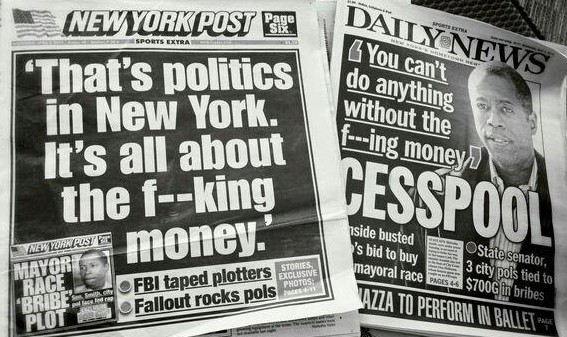By Bob McManus July 26, 2014
Andrew Cuomo is a f—ing steamroller. You gotta problem with that?
US Attorney Preet Bharara apparently does, judging from his reaction to last week’s remarkable, 6,400-word essay in The New York Times detailing gubernatorial interference with an investigating commission Cuomo very publicly imposed on Albany 13 months ago — only to disband it when it started putting heat on him.
Even Cuomo doesn’t dispute that he stuck his thumb in the soup. But he says it was his very own commission — and that he was free to compromise it, or to kill it, whenever.
So he did. So there.
But Bharara, every corrupt New York pol’s monster under the bed, takes exception: “If other people aren’t going to [fight official misconduct], then we’re going to do it. That’s our main mission.”
Cuomo’s legal pettifoggers are, well, pettifogging. But the governor clearly has poked a big stick into a bear cave, and he’s not likely to walk away from the episode with his reputation intact.
Just like the last self-designated avenging angel of Albany — the very much former governor Eliot Laurence Spitzer.
That is, just like the man who — three weeks into his abbreviated gubernatorial term — famously pronounced himself to be a “f—ing steamroller” poised to “roll over [Albany] and anybody else!” (History records that Albany was not amused.)
There are many differences between Spitzer and Cuomo, but the two men have this in common: They are bombastic, profane-in-private control freaks who rarely opt for persuasion when blunt-force trauma is available.
Spitzer’s arrogance is rooted in great wealth, steeped in the unshakeable conviction that he is — in every situation and all possible circumstances — the smartest man in the room. If not the world.
Cuomo is less scrutable. He’s never met the man he can’t stare down, or so he clearly believes. But sometimes the arrogance seems tentative — the product, perhaps, of the same outer-borough insecurities that often hobbled his father, Mario Cuomo.
No matter. The hubris is real, and therein reside the origins of his current problems.
Spitzer, for the record, accomplished precisely nothing during his brief term.
Always a slave to his instincts and appetites, his epic tirades generated first resistance, then paralysis. His effectiveness, such as it was, ended in July 2007, when The Post’s Fredric U. Dicker revealed that he had sent state troopers after political enemies. And when he left office nine months later, the central figure in a bizarre sex scandal, Albany was in near total meltdown.
Then came the surreal David Paterson interregnum — punctuated by the increasingly frequent corruption convictions won by Bharara. Meltdown descended into farce.
And so the scene was set for Andrew Mark Cuomo, who came to office pledged to reform Albany once and for all.
The low-hanging fruit was quickly plucked: Budgeting reform and peripheral tax relief were achieved, and a sense progress was real.
But friction always takes a toll. Cuomo proved to have no appetite for the heavy lifting real change would require — for truly taking on the Legislature, the public-employee unions and other left-leaning special interests — and presently stagnation set in.
And frustration, manifested in unguarded public moments with hectoring speeches characterizing dissenters from the company line — traditional Catholics, Orthodox Jews, Second Amendment supporters and so on — as “extremists” unworthy of intellectual engagement.
Ugly stuff, but par for the Cuomo course.
Meanwhile, Bharara’s federal gumshoes were hard at work. Their increasingly frequent indictments and convictions, from the governor’s perspective, simply underscored how little he himself had accomplished in that respect.
Fast forward to a year ago, after Cuomo’s third legislative session failed yet again to produce significant anti-corruption legislation.
Once more the governor reached for the bludgeon: He appointed a special anti-corruption commission under the state’s 107-year-old Moreland Act — properly employed, that’s Albany’s version of the nuclear option — and handed it a very clear mandate.
“Anything (the commission) wants to look at, they can look at — me, the lieutenant governor, the attorney general, the comptroller, any senator, any assemblyman,” declared Cuomo. [Members] have total control and ability to look at whatever they want to look at.”
Which Albany pol dared argue with that? Complain, yes. Obstruct, no. It was classic, naked Cuomo my-way-or-the-highway coercion.
Imagine Cuomo’s surprise, then, when he discovered that his handcrafted commission had taken him at his word. That it was indeed, according to the Times, looking squarely at his own campaign practices.
That would never do. Key Cuomo aide Larry Schwartz, a bludgeon of his own in hand, descended swiftly on the mutineers.
What happened next isn’t entirely clear — but this much is beyond dispute:
n The Albany establishment was not at all intimidated by Cuomo and his commission, which he folded in less than a year. The entire exercise yielded nothing.
n Preet Bharara, who swiftly confiscated the commission’s records, is now combing through them — methodically and ominously.
Spitzer proved that sometimes steamrollers pop gaskets. Too bad for Cuomo that he wasn’t paying attention.
